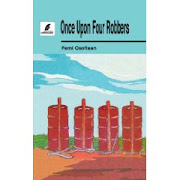Proyecto Inéditos
Questions for Once Upon Four Robbers, by Femi Osofisan
1.- Why is Aafa the same actor as the storyteller?
2.- Do you find any relation between the concept of “Poor Theatre” and this play?
3.-The epilogue: What end would you choose? Who are the robbers?
"Aafa: (Walking round the auditorium). A stalemate? How can I end my story on a stalemate? (…) No, I need your help. One side is bound to win in the end. The robbers, or the soldiers, who are acting on your behalf. So you’ve got to decide and resolve this issue. Which shall it be? Who wins? Yes, madam? Your reasons, please? And you, gentleman? Should the robbers be shot? Pleae, do not be afraid to voice your opinion, we want this play to end. Okay, I’ll take five opinions and we’ll let the majority carry the day… yes? (…) Ladies and gentlemen, the robbers win!"
4.- Why does the story takes place in a market? What does Hasan mean when he says “The world is a market, we come to slaughter one another and sell the parts”
5.- “Grey hair, they say, is of age. Grey hair is not sold in the market” (page 35). What does Aafa mean and what importance does this have in African society?
6.- What religious references can you find in the play?
7.- Alhaja is one of the female characters: what does the author make of African women? What are her options to survive?
8.- “Soldier 1: Fool, how can I overthrow goverment when I’ll be part of it? Let me tell you: all the fine fine palaces on Victoria Island and Ikoyi, all the better lands at Ibadan, Kaduna, Pitakwa and so on, I will declare them for goverment.
Soldier 3: Meaning, for yourself!
Soldier 1: With immediate effect!
Soldier 2: Thief man!
Soldier 1: Whetin. You never hear of African socialism?
Soldier 3: Thay will kill you one day, I assure you.”
What does soldier 1 on page 40 mean by “African Socialism”?
9.- “Sargeant: (…) Shut up, you fool! (…) (Looks round rapidly). Corple, take care of the money. And listen, you dogs who may have been cursed to eternal poverty! As far as we know, the robbers run away with the money! Is that clear? We found nothin, okay? Let us meet later tonight, at my brother’s house. And if I catch anybody with a running mouth…”
The attitude of the Sergeant towards money. What is Osofisan suggesting?
10.- “You run with the hunters, I with the rabbit” (page 42). What do the two brothers symbolize?
2.- Do you find any relation between the concept of “Poor Theatre” and this play?
3.-The epilogue: What end would you choose? Who are the robbers?
"Aafa: (Walking round the auditorium). A stalemate? How can I end my story on a stalemate? (…) No, I need your help. One side is bound to win in the end. The robbers, or the soldiers, who are acting on your behalf. So you’ve got to decide and resolve this issue. Which shall it be? Who wins? Yes, madam? Your reasons, please? And you, gentleman? Should the robbers be shot? Pleae, do not be afraid to voice your opinion, we want this play to end. Okay, I’ll take five opinions and we’ll let the majority carry the day… yes? (…) Ladies and gentlemen, the robbers win!"
4.- Why does the story takes place in a market? What does Hasan mean when he says “The world is a market, we come to slaughter one another and sell the parts”
5.- “Grey hair, they say, is of age. Grey hair is not sold in the market” (page 35). What does Aafa mean and what importance does this have in African society?
6.- What religious references can you find in the play?
7.- Alhaja is one of the female characters: what does the author make of African women? What are her options to survive?
8.- “Soldier 1: Fool, how can I overthrow goverment when I’ll be part of it? Let me tell you: all the fine fine palaces on Victoria Island and Ikoyi, all the better lands at Ibadan, Kaduna, Pitakwa and so on, I will declare them for goverment.
Soldier 3: Meaning, for yourself!
Soldier 1: With immediate effect!
Soldier 2: Thief man!
Soldier 1: Whetin. You never hear of African socialism?
Soldier 3: Thay will kill you one day, I assure you.”
What does soldier 1 on page 40 mean by “African Socialism”?
9.- “Sargeant: (…) Shut up, you fool! (…) (Looks round rapidly). Corple, take care of the money. And listen, you dogs who may have been cursed to eternal poverty! As far as we know, the robbers run away with the money! Is that clear? We found nothin, okay? Let us meet later tonight, at my brother’s house. And if I catch anybody with a running mouth…”
The attitude of the Sergeant towards money. What is Osofisan suggesting?
10.- “You run with the hunters, I with the rabbit” (page 42). What do the two brothers symbolize?
